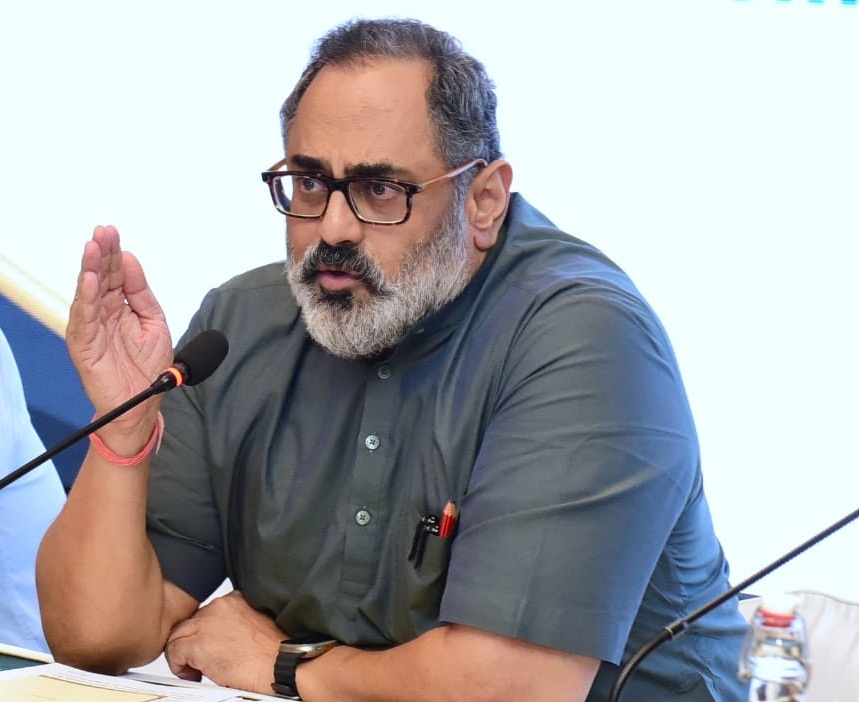Reports said the world’s largest parcel delivery company is apparently in touch with some state governments for its local production plans…reports Asian Lite News
Union Minister Rajeev Chandrasekhar on Wednesday welcomed American major United Parcel Service (UPS) for its plans to manufacture tags used in tracking packages in the country.
UPS is a multinational shipping and supply chain management company founded in 1907.
In a post on X social media platform, Chandrasekhar said the country looks forward to welcoming UPS to start local production.
“@UPS all the best. We look forward to partnering with you to make your India semiconductor manufacturing plans a success and expand,” Chandrasekhar posted.
Reports said the world’s largest parcel delivery company is apparently in touch with some state governments for its local production plans, leveraging a friendly chip investment environment in the country.
The country is on the path to becoming a key player in the global semiconductor supply chain with $10 billion of incentives provided to encourage local chip manufacturing.

From a negligible presence in the global supply chain a decade back, the country now has a significant role to play in the supply chain ecosystem, creating investment and job opportunities.
The IMF estimates say that India will be the world’s third-largest economy by 2027, with a GDP of $5 trillion.
Global giants like Apple, FedEx and Foxconn — along with US-based semiconductor giant Micron — are scaling up manufacturing in India.
Prime Minister Narendra Modi recently laid the foundation stone for chip plants worth over Rs 1.25 lakh crore.
Meanwhile, India has become an alternative investment destination for many Western companies, according to the latest World Economic Situation and Prospects report of the UN.
The report which has increased the forecast of India’s GDP growth by 0.7 percentage points to 6.9 per cent identifies increased foreign investments as an important factor that is propelling the country’s GDP growth.
“The better outlook for India is fuelled by lower inflation, robust exports, and increased foreign investments,” said Hamid Rashid, the chief of the UN’s Global Economic Monitoring Branch.
“India has become an alternative investment source or destination for many Western companies,” he added.
Finance Minister Nirmala Sitharaman said at the CII annual summit on Friday that a Capgemini report has disclosed that 65 per cent of top executives of multinational companies who want to shift their supply chains out of China, plan to invest in India.
US smartphone giant Apple and its suppliers aim to build more than 50 million iPhones in India annually within the next two to three years. Its biggest supplier, Foxconn, is already expanding manufacturing and leading the production shift for Apple by setting up more plants in India. On December 12, the Taiwan-based tech giant received approval from the Karnataka government for an additional investment of Rs 13,911 crore in its upcoming facility in Bengaluru Rural District. It had already received approval to invest Rs 8,000 crore earlier this year.

Work is also underway on Foxconn’s manufacturing facility for iPhones, located near Kempegowda International Airport in Bengaluru. Foxconn aims to produce one lakh units of iPhones by December 2025, 50 lakh units by December 2026, and one crore by December 2027 from this manufacturing facility.
Apple CEO Tim Cook said earlier this month that India is a major focus for the company.
“We are very, very pleased about it. It was a new March quarter revenue record for us. As you know, as I’ve said before, I see it as an incredibly exciting market and it’s a major focus for us,” Cook said.
The investment of US chip giant Micron Technology which is setting up a factory in Sanand, Gujarat, demonstrates the rising interest of American companies in the country, according to Arun Venkataraman, US Assistant Secretary for Commerce, who visited Mumbai recently. He said India’s PLI schemes are a step in the right direction.
In June last year, Micron Technology announced plans to build a new assembly and test facility in Sanand for an initial investment of $825 million over the two phases of the project shortly after PM Modi’s visit to Washington where he met the CEOs of top US companies.
As per the Indian government’s scheme, Micron will receive 50 per cent fiscal support for the total project cost from the Centre, and incentives representing 20 per cent of the total project cost from Gujarat. The combined investment by Micron and the two government entities over both phases will be up to $2.75 billion. Apart from Micron, the Tata group has also announced investments in setting up semiconductor units in India.
Micron’s plant which is expected to transform Sanand into a high-tech semiconductor is the first mega project cleared under the Central government’s $10 billion incentive plan to woo global chipmakers.
Sitharaman said that the government was keen to push the growth of the manufacturing sector and expects it to play a bigger role in the economy as part of the Aatmanirbhar Bharat campaign.
She highlighted that the Government’s PLI scheme had resulted in transforming the electronics sector.
“While import dependence for mobile phones was as high as 78 per cent in 2014, today 99 per cent of all mobile phones are made in India,” Sitharaman remarked.
She pointed out that the success in import substitution in the telecom sector was now as much as 60 per cent, reflecting the higher self-reliance achievement as part of the government’s Aatmanirbhar Bharat policy.

Leave a Reply